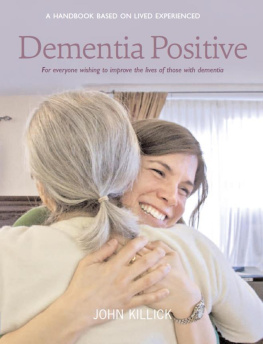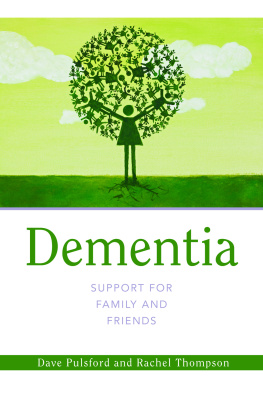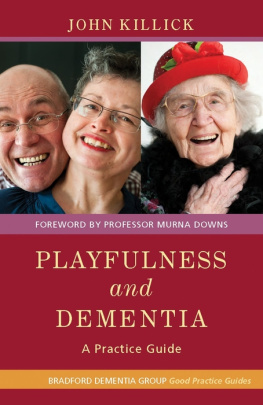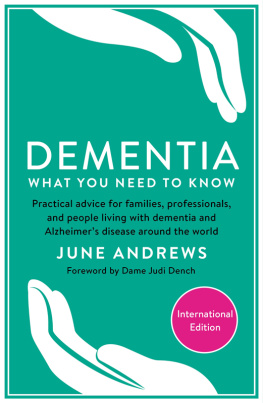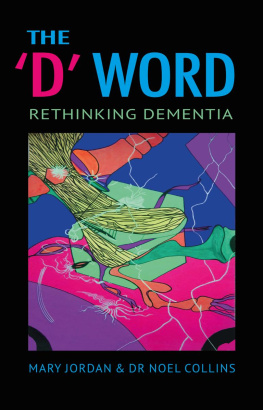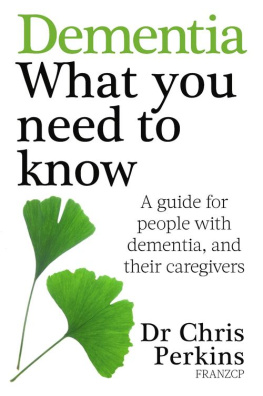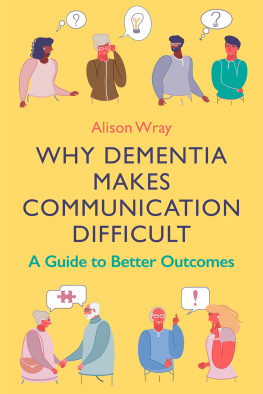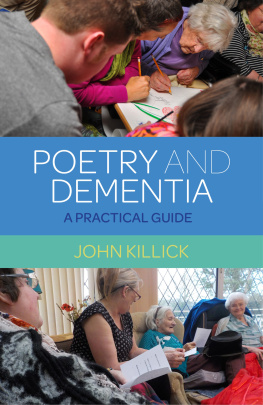JOHN KILLICK was a teacher for 30 years, and has been a writer all his life. He has published books of his own poetry and books on creative writing. He began working with people with dementia in 1992, and has held a number of posts with nursing homes, hospitals, libraries and arts centres. With Kate Allan, John created and moderates the website www.dementiapositive.co.uk . He has edited six books of poems by people with dementia, and co-authored books on communication and on creativity. He has written many articles and book chapters, and given many workshops in the UK and abroad. He has also made a number of appearances on radio and TV.
By the same author:
Playfulness and Dementia: A Practical Guide
(Jessica Kingsley, 2012)
Creativity and Communication in Persons with Dementia: A Practical Guide (with Claire Craig, Jessica Kingsley, 2011)
Communication and the Care of People with Dementia (with Kate Allan, Open University Press, 2001)
DEMENTIA POSITIVE
A HANDBOOK BASED ON LIVED EXPERIENCES
For everyone wishing to improve the lives of those with dementia
JOHN KILLICK

Luath Press Limited
EDINBURGH
www.luath.co.uk
First published 2013
eBook 2013
ISBN (print): 978-1-908373-57-1
ISBN (eBook): 978-1-909912-41-0
The authors right to be identified as author of this work under the Copyright, Designs and Patents Act 1988 has been asserted.
John Killick
You did then what you knew how to do and when you knew better you did better.
MAYA ANGELOU
We receive and we lose, and we must try to achieve gratitude; and with that gratitude to embrace with whole hearts whatever of life that remains after the losses.
ANDRE DUBUS
I dwell in Possibility
EMILY DICKINSON
CONTENTS
ACKNOWLEDGEMENTS
I would especially like to express my gratitude to Caroline Brown, Kate Grillet and Helen Finch for their contributions, and for their comments on the manuscript generally. The extracts by all three of these individuals have been specially offered to me for this book. Kate Allan has once again been my sternest, and therefore most valuable, critic. I owe the format of the book to her as well, which I have borrowed from her groundbreaking training resource Finding Your Way , alas no longer available.
I am also grateful to Cathy Greenblat for the use of one of her wonderful photographs on the cover: this surely sets the tone for what this book is about.
INTRODUCTION
You will already have read three quotations which I have chosen because, despite the fact that dementia was probably not in the writers minds when they wrote them, I believe they carry the message of this book.
I would like to apply these not just to dementia but specifically to those of us in a supporting role. They are a call to arms, but of the compassionate rather than the military sort. They offer us what I would like to call a manageable challenge.
Its a challenge I took on over twenty years ago, and its a never-ending one. I have gradually come to see more and more people engaging with a vision of how life with the condition could be, and can be. In this book I want to reflect that vision and their experience.
For myself, I was a teacher for thirty years, and a writer in my spare time. Then I left the classroom behind to live a life in a writers study. Only thats not how it worked out. I had to earn a living, so I began to take writers residencies, placements in the community where one can be of use in a different way from writing poems and stories of ones own. I worked first in a womens prison, then a hospice, and latterly in care homes. I began with the life stories of older residents, then I met my first person with dementia.
I knew then that I had found the area I wanted to concentrate on. There was a crying need (sometimes literally) for peoples voices to be heard, and written down, and shared back with them. It was a way of confirming for them that they were still there. It was a way of reassuring them that their words were still of importance.
I thought a lot about the process I was engaged in, and I began to listen to what others were saying about the condition, particularly those who had experience of it through family and friends. I realised that there was something about the subject that makes communication and relationships especially important, and wanted to share my viewpoint with others. I believe it has all been leading up to this book.
I cant tell you much about plaques, tangles or drugs Im not qualified to do so. I dont deal with diet or exercise though these are positive strategies which complement those I concentrate on.
My conviction is that one persons experience, however extensive, is by no means the whole story. So eighteen of the nineteen chapters include a section solely dedicated to the words of people with dementia themselves, and those who come into contact with them family and friends mainly, but some professionals as well, where I thought their insights might be helpful. You can find out where these quotes come from at the back of the book.
In Chapter One I consider the language we use to talk about dementia. It is very important to get the words right. I have decided to use the term dementia sparingly because it becomes monotonous, so when I refer to someone with dementia I often use the word person, and sometimes the phrase person with the condition. I also want to avoid the word carer as much as possible, because it always puts the person with dementia into a dependent role. I have decided to use the term supporters for those closest to the person (often referred to in other books as primary carers) as well as the rest of family and friends. I am excluding professional carers here: their relationship is necessarily on a different basis. That is not to say that some of what I and others have to say in these pages may not resonate with them, but they are not the main audience I am addressing.
I say I have a vision of how things could be thats true, but I dont want to stray too far from things as they are. However, there is still so much negativity swirling around this subject, I have no intention of adding to that. I have looked for the upbeat wherever I can find it and it seems justified.
But I dont want you to come away from this introduction with the feeling that I am going to give you lots of dogmatic pieces of advice. I have learnt enough to know that that would be deceiving. We are dealing with, on the one hand, possibly the most complex condition humans can face, and on the other, individuals in all their diversity. So this is a book of hints and potentials, not certainties. If you find me overstepping the mark, please give me a mental wrap on the knuckles!
We have a long way to go in creating the ideal dementia world. Maybe that is a world in which it never occurs to us to use the word. But starting from where we are now I believe we can all make a difference, however small, in the spirit of the quotations at the head of the book. The first thing we need to do is to stop fighting the condition, as some experts and organizations would have us do, and adopt a mindset of cooperating with it. (I do not mean by this that we should refrain from fighting for the services we believe we deserve!) I am referring to an attitude of acceptance rather than conflict in how dementia is viewed by both person and supporter. That should take us a lot further. I hope to show you some ways in which this can be achieved.

